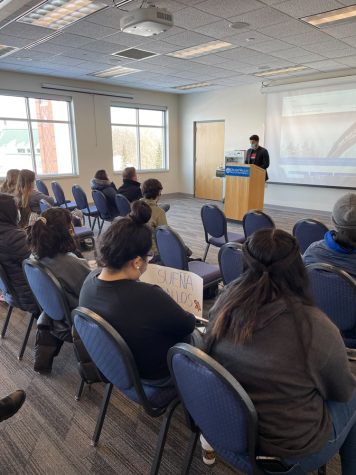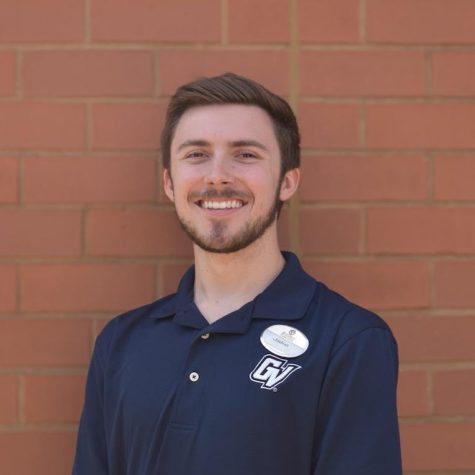UndocuWeek highlights issues faced by DACA and undocumented students
Jan 31, 2022

For the second straight year, Grand Valley State University’s Office of Multicultural Affairs hosted UndocuWeek, a weeklong series of events focused on advocacy and allyship for Deferred Action for Childhood Arrivals (DACA) recipients and undocumented immigrants. This year’s UndocuWeek included four different events that culminated in a solidarity walk across campus.
DACA is an immigration policy that allows undocumented immigrants that arrived in the United States as children to receive a renewable two-year deferment from being deported. The policy was passed by the Obama administration in 2012 and expanded in 2014.
GVSU, which is home to many DACA and undocumented students, doesn’t require proof of citizenship during the admission application process. On the GVSU Resources for DACA and Undocumented Students website, quotes from both of the last two University presidents reaffirm that policy.
“We have a culture at Grand Valley that is committed to supporting our students; all our students,” said President Philomena Mantella. “We encourage those who are qualified and prepared to tackle a rigorous education, to apply to become a Grand Valley State University Laker. You will be welcome.”
It’s in that spirit that UndocuWeek is held. The purpose of the event is to educate students about their undocumented peers and to highlight the many issues they face while living and attending college in the U.S. Thalia Guerra-Flores, Assistant Director of the Office of Multicultural Affairs, said the event is also a way to showcase the resources GVSU offers to DACA and undocumented students.
“To me, it is important to show that our campus offers services and support to our DACA and undocumented students,” Guerra-Flores said. “We are one of the very few college campuses that outwardly has a dedicated website for DACA and undocumented students, a campus advocate, UndocuALLY trainings and a week-long event.”
An UndocuALLY training session with Guerra-Flores is one of the four events that make up UndocuWeek. UndocuALLY is a nationwide program and these trainings are given at universities all across the country. The program’s goal is to identify and support allies of undocumented students and those who advocate solutions to undocumented issues.
“It is a presentation that was created by our former graduate student Estefany Paniagua-Pardo before I came to the institution,” Guerra-Flores said. “The presentation goes over some of the history of DACA and what you can do as a community member to be an ally to this population.”
UndocuWeek also includes a showing of the documentary “The Unafraid,” which follows three DACA students living in Georgia, a state that has banned undocumented and DACA students from receiving in-state tuition rates at public universities. Despite the film being four years old, its content is still relevant as today’s DACA students face the same issues.
“We wanted the campus community to learn about the experiences of DACA students in higher education,” Guerra-Flores said. “The state of DACA remains the same. Advocates are still seeking a permanent solution for a pathway to citizenship through the American Dream and Promise Act and the Farm Workforce Modernization Act.”
GVSU alum Veronica Beltran, who is the Legal Director for the Southwest Detroit Immigrant and Refugee Center, gave a virtual presentation titled “Immigration 101”. The presentation covered legal issues faced by immigrants as well as helpful immigration resources.
Beltran spoke about what students can do to help their undocumented and DACA classmates.
“If someone has disclosed their status to you personally, ask them what you can do to help,” Beltran said. “What would be supportive, outside of having a personal relationship with someone, would be creating a mobilized effort or doing something like a fundraiser for renewal fees.”
DACA and undocumented students face many barriers of entry when it comes to enrolling in college, many of which are exacerbated in southern states. Alabama and South Carolina go so far as to prohibit undocumented students from enrolling at any public postsecondary-education institution.
Other restrictions, like being unable to get driver’s licenses and apply for FAFSA, make attending college extremely difficult even for students that are allowed to attend public universities.
“I think the biggest thing for me, that I hope students understand, is the resiliency that undocumented students have, and the hard work and dedication they have,” Paniagua-Pardo said. “They’re putting in work to overcome all those issues and to still show up day after day to class and to succeed in higher education and get a degree at the end of it.”
UndocuWeek concluded with a solidarity walk through the Allendale campus. Members of the Office of Multicultural Affairs joined students and others from the community to show their support for DACA and undocumented students.
“It’ll show our students the actual support of the people and we can all group together and combine as a community,” Paniagua-Pardo said. “So, I think it’ll be really good for our students to know that regardless of what they may be going through, regardless of their life or home situation, that there is a group of people that are willing to learn about what it means to be undocumented or DACA.”
More information about UndocuWeek and other ways to get involved with Multicultural Affairs events can be found at www.gvsu.edu/oma.






















